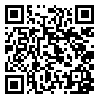Volume 9, Issue 2 (Spring 2021)
PCP 2021, 9(2): 103-110 |
Back to browse issues page
1- Department of Clinical Psychology, School of Behavioral Sciences and Mental Health (Tehran Institute of Psychiatry), Iran University of Medical Sciences, Tehran, Iran.
2- Department of Clinical Psychology, School of Behavioral Sciences and Mental Health (Tehran Institute of Psychiatry), Iran University of Medical Sciences, Tehran, Iran. , ramezanifarani.a@iums.ac.ir
3- Mental Health Research Center, School of Behavioral Sciences and Mental Health (Tehran Institute of Psychiatry), Iran University of Medical Sciences, Tehran, Iran.
2- Department of Clinical Psychology, School of Behavioral Sciences and Mental Health (Tehran Institute of Psychiatry), Iran University of Medical Sciences, Tehran, Iran. , ramezanifarani.a@iums.ac.ir
3- Mental Health Research Center, School of Behavioral Sciences and Mental Health (Tehran Institute of Psychiatry), Iran University of Medical Sciences, Tehran, Iran.
Abstract: (2244 Views)
Objective: Cognitive theories and research have focused on the relationship between emotions, particularly anxiety, and the positive symptoms of psychosis. The aim of this study, based on Beck’s cognitive theory, was to compare dysfunctional attitudes and cognitive insight between patients with anxiety disorders and those with delusion.
Methods: The study sample consisted of 90 participants in 3 groups (anxiety=30, delusion=30, healthy=30). The study subjects were interviewed using Structured Clinical Interview (SCID-I) for the Diagnostic and Statistical Manual of Mental Disorders, Fourth Edition (DSM-IV). Then, they completed Beck Anxiety Inventory (BDI), Peters et al.’s Delusions Inventory (PDI), General Health Questionnaire-28 (GHQ-28), Dysfunctional Attitudes Scale-26 (DAS-26), and Beck Cognitive Insight Scale (BCIS).
Results: The present research results indicated that anxiety and delusion groups presented significantly greater dysfunctional attitudes than the healthy subjects (P<0.001); however, there was no significant difference between the clinical groups. The anxiety group had significantly higher cognitive insight than the delusional (P<0.05) and normal groups (P<0.01); however, there was no significant difference between the last two groups.
Conclusion: Dysfunctional attitudes can be considered as a common aspect and cognitive insight as a differentiating aspect of anxiety and psychosis.
Methods: The study sample consisted of 90 participants in 3 groups (anxiety=30, delusion=30, healthy=30). The study subjects were interviewed using Structured Clinical Interview (SCID-I) for the Diagnostic and Statistical Manual of Mental Disorders, Fourth Edition (DSM-IV). Then, they completed Beck Anxiety Inventory (BDI), Peters et al.’s Delusions Inventory (PDI), General Health Questionnaire-28 (GHQ-28), Dysfunctional Attitudes Scale-26 (DAS-26), and Beck Cognitive Insight Scale (BCIS).
Results: The present research results indicated that anxiety and delusion groups presented significantly greater dysfunctional attitudes than the healthy subjects (P<0.001); however, there was no significant difference between the clinical groups. The anxiety group had significantly higher cognitive insight than the delusional (P<0.05) and normal groups (P<0.01); however, there was no significant difference between the last two groups.
Conclusion: Dysfunctional attitudes can be considered as a common aspect and cognitive insight as a differentiating aspect of anxiety and psychosis.
Keywords: Dysfunctional attitudes, Cognitive insight, Anxiety disorders, Psychotic disorders, Delusion
Type of Study: Research |
Subject:
Cognitive behavioral
Received: 2020/12/10 | Accepted: 2021/03/5 | Published: 2021/04/1
Received: 2020/12/10 | Accepted: 2021/03/5 | Published: 2021/04/1
| Rights and permissions | |
 |
This work is licensed under a Creative Commons Attribution-NonCommercial 4.0 International License. |





